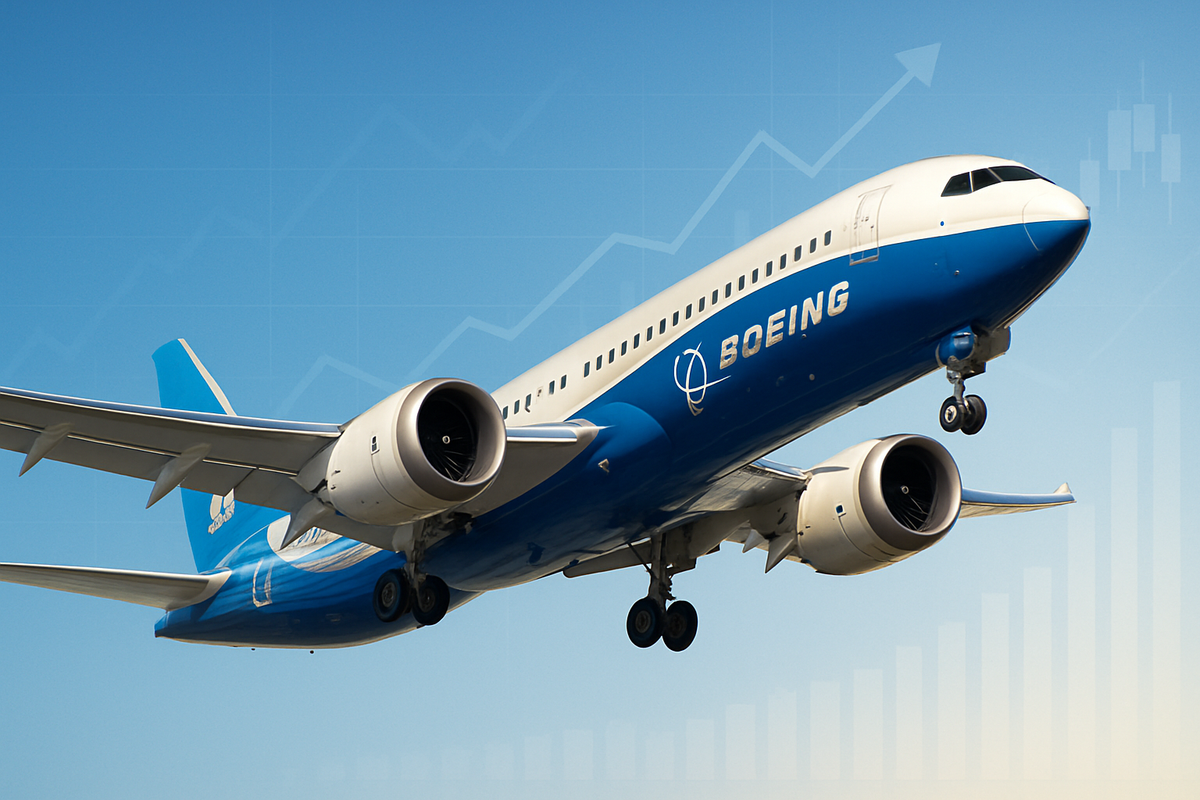
September 26, 2025 – Boeing Co. (NYSE: BA) is experiencing a significant uplift in its fortunes, propelled by a flurry of massive new aircraft orders and the imminent easing of critical Federal Aviation Administration (FAA) restrictions. These twin developments have sent the aerospace giant's shares surging, signaling a potential turning point in its arduous journey to recovery following years of safety scrutinies and production challenges. The market's enthusiastic reaction underscores a renewed confidence in Boeing's ability to navigate past headwinds and reclaim its dominant position in the global aviation sector.
The confluence of robust demand from major international carriers and a thawing in regulatory oversight marks a pivotal moment for Boeing. With its stock demonstrating strong year-to-date performance and specific order announcements triggering immediate jumps, the company appears poised for a period of accelerated growth and improved operational efficiency. This positive momentum is not just a win for Boeing, but also a significant indicator for the broader aerospace supply chain and the global travel industry, which continues its post-pandemic expansion.
A Cascade of Confidence: Orders Flood In as FAA Relaxes Grip
The past year, particularly late 2024 and throughout 2025, has seen Boeing secure an impressive array of new business, fundamentally reshaping its order book. Among the most notable agreements is a landmark deal with Turkish Airlines for up to 225 aircraft, encompassing 75 Boeing 787 Dreamliners and a commitment for up to 150 737 MAX jets. Further bolstering its backlog, the Norwegian Group placed a direct order for 30 737-8 airplanes on September 26, 2025, marking their first direct purchase from Boeing since 2017. Additionally, Uzbekistan Airways committed to up to 22 787 Dreamliners in an $8 billion deal highlighted on September 23, 2025, while Cathay Pacific (HKEX: 0293) ordered 14 Boeing 777-9 jets in August 2025. These, alongside eight new orders for 737 MAX from undisclosed customers in April 2025, reflect a strong and diverse global demand for Boeing's commercial aircraft.
Concurrently, the FAA is taking crucial steps to restore some of Boeing's long-held authorities, which were curtailed following the 2019 737 MAX crashes and further tightened after the January 2024 Alaska Airlines (NYSE: ALK) incident. Federal regulators are in the process of restoring Boeing's authority to perform final safety checks on its 737 MAX jets in phases, allowing Boeing employees to conduct certain inspections and safety sign-offs. Similar authority is expected to be regained for the 787 Dreamliner program. While the FAA will maintain final airworthiness certification and focus on monitoring production quality, this move signifies a critical vote of confidence in Boeing's enhanced safety protocols and manufacturing processes. The agency is also reportedly considering raising the 737 MAX production cap from 38 planes per month to 42, with potential for further increases, a significant step towards alleviating production bottlenecks.
The immediate market reaction has been overwhelmingly positive. Boeing shares have surged throughout 2025, boasting a year-to-date return of 20.64% and a 39.1% increase over the past year, significantly outperforming the S&P 500 (INDEXSP: .INX). Specific order announcements, such as the Uzbekistan Airways deal, triggered immediate premarket jumps of over 2%. This robust performance is underpinned by investor anticipation of reduced oversight costs, faster delivery cycles, and a general resurgence in customer trust, all contributing to a healthier financial outlook for the company despite its current negative earnings per share.
Supply Chain Rejuvenation and Competitive Shifts
The resurgence of Boeing Co. (NYSE: BA) with significant new orders and eased FAA restrictions is poised to send ripple effects throughout the aerospace and defense industry, creating clear winners and losers. The most direct beneficiaries will undoubtedly be Boeing itself and its extensive network of suppliers. Companies like Spirit AeroSystems Holdings Inc. (NYSE: SPR), a major supplier of fuselage and wing components for the 737 MAX and other Boeing aircraft, are expected to see increased production rates and a more stable order flow. Other key suppliers, including those providing engines (e.g., General Electric Co. (NYSE: GE) for the GEnx engines on the 787 and CFM International, a joint venture between GE and Safran S.A. (EPA: SAF), for the LEAP-1B engines on the 737 MAX) and avionics, will likely experience a significant boost in their own manufacturing and revenue.
Conversely, competitors, most notably Airbus SE (EPA: AIR), may face intensified pressure in the narrow-body and wide-body markets. While Airbus has maintained a strong market position during Boeing's recent challenges, a revitalized Boeing with improved production capabilities and a strong order book will undoubtedly lead to more aggressive competition for future airline contracts. This renewed rivalry could impact pricing strategies and market share dynamics, potentially making it harder for Airbus to secure uncontested dominance in key segments. Airlines, on the other hand, stand to benefit from increased competition, which could lead to better deals and more diverse options for fleet modernization and expansion.
Beyond direct competitors and suppliers, the financial health of airlines themselves is intrinsically linked to aircraft availability and cost. Faster delivery cycles from Boeing, enabled by eased restrictions and increased production, could help airlines meet growing passenger demand more efficiently. This could translate into expanded route networks and improved profitability for carriers, especially those heavily invested in Boeing fleets. However, any continued production hiccups or further safety incidents, despite the current positive outlook, could quickly reverse these gains, underscoring the delicate balance of trust and operational excellence required in the aviation sector.
Broader Implications: Industry Trends and Regulatory Evolution
This pivotal moment for Boeing Co. (NYSE: BA) transcends immediate financial gains, signaling deeper shifts within the global aerospace industry. The company's recovery aligns with broader trends of robust air travel demand, particularly in emerging markets and for long-haul routes, which favor both its 737 MAX narrow-body and 787/777X wide-body offerings. The substantial orders from Turkish Airlines, Uzbekistan Airways, and Cathay Pacific underscore the ongoing fleet modernization efforts by airlines worldwide and the sustained growth in passenger traffic projections. This resurgence is critical for maintaining a competitive two-player market with Airbus SE (EPA: AIR), ensuring innovation and preventing a monopoly that could disadvantage airlines and ultimately, consumers.
The FAA's decision to gradually restore Boeing's authority for final safety checks represents a significant evolution in regulatory oversight. This move suggests a shift from direct intervention to a more collaborative monitoring approach, provided Boeing consistently meets stringent quality and safety benchmarks. It reflects a regulatory environment that aims to empower manufacturers while maintaining rigorous oversight, a balance crucial for the industry's efficiency and safety. The historical context of this situation, stemming from the 737 MAX crashes and the Alaska Airlines incident, highlights the industry's learning curve and the ongoing commitment to enhancing safety protocols across the board. This regulatory adaptation could serve as a precedent for how other major manufacturers are overseen, emphasizing a performance-based approach to compliance.
Potential ripple effects extend to the global supply chain, where increased production rates for Boeing will necessitate ramp-ups from thousands of component manufacturers and service providers. This could lead to job creation and economic growth in regions heavily reliant on aerospace manufacturing. Furthermore, the renewed confidence in Boeing could influence geopolitical dynamics, particularly concerning potential orders from Chinese carriers. A significant order from China, speculated to involve 500 aircraft, would not only be a massive financial boon but also signify a thawing in trade relations and a re-establishment of Boeing's presence in a critical market, impacting the global balance of power in aviation trade.
The Flight Path Ahead: Strategic Maneuvers and Emerging Opportunities
The path forward for Boeing Co. (NYSE: BA) will be defined by its ability to capitalize on this renewed momentum while meticulously managing ongoing challenges. In the short term, the company's immediate focus will be on smoothly integrating the new orders into its production schedule and demonstrating consistent quality control to the FAA. Successfully raising the 737 MAX production cap to 42 aircraft per month and beyond, while maintaining zero defects, will be paramount. This requires meticulous execution across its manufacturing facilities and a robust supply chain to avoid bottlenecks that could undermine confidence. Strategic pivots may involve further investments in automation and digital manufacturing to enhance efficiency and traceability, ensuring every aircraft meets the highest safety standards.
Looking long-term, Boeing faces both significant opportunities and potential pitfalls. The sustained demand for air travel, coupled with an aging global fleet, presents a vast market for both narrow-body and wide-body aircraft. Boeing's ability to innovate with new models, such as the ongoing development of the 777X and potential future designs, will be crucial for maintaining its competitive edge against Airbus SE (EPA: AIR). Market opportunities include expanding its footprint in cargo conversion and defense contracts, leveraging its engineering prowess. However, challenges persist, including managing geopolitical tensions that could affect international orders, navigating volatile raw material costs, and attracting and retaining skilled labor in a competitive market.
Potential scenarios range from a sustained, robust recovery leading to record deliveries and profitability, to a more tempered growth path if unforeseen production issues or new safety concerns emerge. A key outcome to watch will be the finalization of any major orders from Chinese airlines, which could significantly alter Boeing's market share and revenue projections for the next decade. The company's strategic adaptation to sustainable aviation fuels (SAF) and other decarbonization initiatives will also be critical, as environmental considerations increasingly influence airline purchasing decisions and regulatory frameworks.
Charting a New Course: A Resilient Future for Boeing
The recent surge in massive aircraft orders and the easing of FAA restrictions mark a significant turning point for Boeing Co. (NYSE: BA), heralding a period of potential resurgence for the aerospace giant. The key takeaways from this event are clear: global demand for air travel remains robust, airlines are actively modernizing and expanding their fleets, and regulatory bodies are showing renewed confidence in Boeing's ability to produce safe and reliable aircraft, albeit under continued scrutiny. This confluence of factors has injected much-needed optimism into Boeing's outlook, driving its stock performance and setting the stage for accelerated operational recovery.
Moving forward, the market will closely assess Boeing's execution on its expanded order book and its ability to maintain impeccable quality control as production rates increase. The successful phased restoration of its authority for final safety checks is a crucial step, but sustained vigilance and a culture of safety will be paramount to prevent any recurrence of past issues. Investors should watch for consistent delivery performance, progress on the 737 MAX production cap increases, and any further announcements regarding significant international orders, particularly from key strategic markets like China.
Ultimately, this period represents a pivotal moment for Boeing, offering a chance to solidify its recovery and redefine its future trajectory. The lasting impact will hinge on the company's commitment to operational excellence, innovation, and unwavering dedication to safety. If Boeing can consistently deliver on these fronts, it stands to not only regain its former glory but also emerge as a more resilient and trusted leader in the global aerospace industry for years to come.
This content is intended for informational purposes only and is not financial advice





